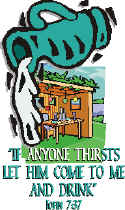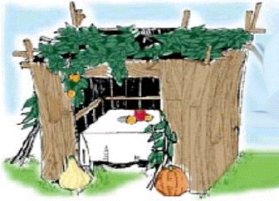Articles on Sukkot
Sukkot: A Promise of Living Water
Written by Fred Klett
When summer is gone, the final harvest is ready. Nimble fingers separate grapes from the vines. Some of the harvest is laid out for the sun to sweeten into delicious dried fruit: raisins. Huge quantities of grapes are crushed and their juice is stored in large earthen vats until the proper time for it to be poured into wineskins to complete the fermentation process. All look forward to the abundance of wine, which King David said "gladdens the heart." (Psalm 104:15)
Each of the family joins in collecting the fruit of the land, the fruit God has provided for his people. Children scramble to fill oversized baskets with figs and dates which will be molded into cakes for a sweet confection to be used in the months ahead. Some dates will be made into a sweet syrup, date honey.
The apple fragrance sets mouths to watering and telltale stains from bright red pomegranates are evidence that some have sampled the fruit to "taste and see that the LORD is good." (Psalm 34:8)
Then it is time to harvest the olives. The lush dark green olive trees on the terraced hillsides are black with the ripe fruit. Everyone joins in the exhausting but exhilarating work, stripping the trees of their fruit. Copious volumes of olives are collected and then crushed under the massive rolling stone of the olive press to extract the precious oil for cooking or fuel for the oil lamps or for anointing. The oil will also provide the base for soap as well as for unguent, a healing ointment to spread over one's wounds....

The Biblical Holy Day of Sukkot
Written by Robin Sampson T he Feast of Tabernacles is a week-long autumn harvest
festival. Tabernacles is also known as the Feast
of the Ingathering, Feast of the Booths, Sukkoth,
Succoth, or Sukkot (variations in spellings occur
because these words are transliterations of the
Hebrew word pronounced “Sue-coat”).
The two days following the festival are separate
holidays, Shemini Atzeret and Simkhat Torah, but
are commonly thought of as part of the Feast of
Tabernacles.
T he Feast of Tabernacles is a week-long autumn harvest
festival. Tabernacles is also known as the Feast
of the Ingathering, Feast of the Booths, Sukkoth,
Succoth, or Sukkot (variations in spellings occur
because these words are transliterations of the
Hebrew word pronounced “Sue-coat”).
The two days following the festival are separate
holidays, Shemini Atzeret and Simkhat Torah, but
are commonly thought of as part of the Feast of
Tabernacles.
The Feast of Tabernacles was the final and most important holiday of the year. The importance of this festival is indicated by the statement, “This is to be a lasting ordinance.” The divine pronouncement, “I am the Lord your God,” concludes this section on the holidays of the seventh month. The Feast of Tabernacles begins five days after Yom Kippur on the fifteenth of Tishri (September or October). It is a drastic change from one of the most solemn holidays in our year to one of the most joyous. The word Sukkoth means “booths,” and refers to the temporary dwellings that Jews are commanded to live in during this holiday, just as the Jews did in the wilderness. The Feast of Tabernacles lasts for seven days and ends on the twenty-first day (3x7) of the Hebrew month of Tishri, which is Israel’s seventh month.
This holiday has a dual significance: historical and agricultural (just as Passover and Pentecost). Historically, it was to be kept in remembrance of the dwelling in tents in the wilderness for the forty-year period during which the children of Israel were wandering in the desert.
It is expounded in Leviticus 23:43 That your generations may know that I made the children of Israel to dwell in booths, when I brought them out of the land of Egypt: I am the LORD your God.

Sukkot
Written by Glenn Kay
I n contrast to the somber tone of Yom Teruah and Yom Kippur, the third feast is a time of pure joy. The time of introspection and searching now make way for the feast called; "The season of our rejoicing."
The name comes from the Hebrew - Sukkot; meaning - tabernacles, booths. It comes from the command in (Lev 23:42-43). The impermanent leafy shelters were to remind the Israelites of God's faithfulness during their forty years of wandering in the wilderness. The tabernacles symbolized man's need to depend on God for His provision of food, water, and shelter
The feast of Ingathering
The command to build tabernacles and dwell in them coincided annually with Israel's final harvest of the season, and so the name "Feast of Ingathering " was used of the holiday as well.
We see this being applied to the feast in : Lev 23:34; Deut 16:13. The emphasis is on the relationship to the holiday to the final gathering of the crops in the fall.
Ancient Israel's economy was agrarian. the seasons guided Israel's activities. each season's plentiful harvest brought a renewed sense of relief and thankfulness that they would not go hungry for God had once more provided for His people. It is this feast which provided the Pilgrims with the Biblical foundation for the first Thanksgiving observance. ...

A Messianic Midrash: The Miracle at Sukkot
The Feast of Tabernacles had ended. The crowds had dispersed and those who had traveled to Jerusalem from the outlying regions were making their way home. The sukkahs were being cleared away along with well-shaken lulavs, bent and broken from the joyous celebration. Jerusalem was returning to its usual bustling pace. People were still talking about the spectacular light that had shone from the Temple and cast a glow upon the whole city. However, it was difficult for the man who sat by the entrance to the Temple courtyard to understand these conversations. He had never beheld the giant candelabra shining into the night. And although he had felt its warmth and heard it crackle, he had never even seen fire. For this man had been born blind. "I was blind when the festival began and now it's over, and I am blind still," he thought. "And so it shall probably be until the end of my days; I shall sit here, begging for a few measly coins always." He nodded in the direction of the sound of someone walking into the Temple. "The Lord bless you," he said to the wind.
Later that day, he heard a group of people approaching. The group paused before him and the blind man heard one of them ask, "Rabbi, who sinned, this man, or his parents, that he should be born blind?" The beggar steeled himself for the answer to come. He didn't think he could bear it if the rabbi were to say something about his parents, whom he loved and who had always shown him compassion, even though they must have been disappointed that their child was...well, broken.
As these thoughts went through his mind, he heard the rabbi reply, "It was neither that this man sinned, nor his parents; but it was so that the works of God might be displayed in him." The beggar was astonished and then he had another thought, but he was too afraid to speak it: "This must be the man called Yeshua." He had heard rumors and rumblings about Jesus for weeks. People spoke freely about him in front of the beggar, for they must have assumed that just because he couldn't see, there must be something wrong with his hearing. So the blind man had heard plenty. Some had called Yeshua a lunatic or a liar, but many were saying that he was the Prophet who was to come, that he was the Messiah, the Anointed One....

Celebrating Sukkot! An Encouraging Perspective
Written by Sam Nadler
Sukkot is also called the Feast of the Harvest, and as a harvest feast, Sukkot reminds us of our Sovereign God's wonderful provision for our lives.
Leviticus 23 contains a statute for Jewish people to live in booths every year, reminding us of the wilderness journey from Egypt to the Promised Land: Ye shall dwell in booths seven days; all that are Israelites born shall dwell in booths: That your generations may know that I made the children of Israel to dwell in booths, when I brought them out of the land of Egypt: I am the LORD your God (Leviticus 23:42-43). The Sukkot festival consists of seven days of continual, joyous celebration, with 'the Great Day of the Feast', called Hoshanna Rabbah, on the 7th day, followed by a solemn assembly on the eighth day.
Sukkot is the culmination of all the feasts on God's redemptive calendar, and points prophetically to the end-time harvest of souls.
Sukkot also reminds us to renew our perspective on how we use our time, talent and treasure for the greatest spiritual impact and blessing. In the days of Haggai the prophet, the Feast of Sukkot offered a fascinating opportunity for the people to appreciate all that God would do for them, as it does for us today!
A Problem PerspectiveGod's people were dealing with a problem of perspective, and the prophet Haggai exposed their selfish priorities, which had led them to a superficial point of view. After returning from the Babylonian Captivity, Israel had prioritized the rebuilding of God's house before building their own (Haggai 1:9), but when they realized the new temple would be smaller than the previous Temple of Solomon they became discouraged (Hag. 2:3; also Ezra 3:12) and didn't want to continue. We can all relate to the discouraging problem that life isn't always as glorious as we had hoped it would be. It's easy to lose perspective and not appreciate all that God has done and is doing, according to His agenda, especially when we may have had our own agenda.

Rejoice Sukkot
Written by Moshe MorrisonThe root "samach" is used nearly 200 times in the Hebrew scriptures. It is rendered in English in various places as joy, gladness, pleasure, mirth, rejoicing, or joyfulness. It describes the condition of the hearts and minds of people, and in some cases it is attributed to creation, "Let the heavens rejoice; let the earth be glad???????" (Psalm 96:11). The first place where it appears in the form of a command, however, is in Leviticus 23:40 in connection with Sukkot:
Now on the first day you shall take for yourselves the fruit of beautiful trees, palm branches, and boughs of leafy trees and willows of the brook; and you shall rejoice before the Lord your God for seven days.
Rejoicing is again commanded in Deuteronomy 12:7; 18; 14:26; 16:11; 14; 26:11 and 27:7. Though, in these passages, Sukkot is specifically mentioned only in 16:14, all the aspects of the rejoicing that are described are quite applicable for Sukkot. In all these verses, there are common features: the bountiful blessings of God, offerings of gratitude, being in the place of His presence, and feasting together with family and others. They are certainly very suitable applications for our modern day celebrations.
Modern city dwellers, however, often do not relate to the realities of harvest in their everyday lives. Even the appearance, or disappearance, of certain foods on the supermarket shelves has less to do with the local seasons than with modern methods of preservation and shipping. Sukkot serves as a tool in the hand of God to help us remember and return to the basic truth that God is our source. Most of us have lost our connection to "the land," and a daily sensitivity to the effect of weather on crops. How fitting, then, to dwell in booths and hold the produce of the earth in our hands and feel again our utter dependence on the Lord of the Harvest. The blessings of God come in many forms and the harvest theme of Sukkot can represent all the good that the Lord has done for us in any way. It is a time to joyfully give thanks for every good gift....

Sukkot (Feast of Booths)
Written by Nehemia Gordon On Chag Ha-Sukkot, Feast of Booths (Tabernacles) we are commanded to build a Sukkah (Booth) using as building materials the "4 species" listed in Lev 23:40. Rabbinical tradition teaches that a bundle of these building materials must be ritually waved in the air during the festival.
On Chag Ha-Sukkot, Feast of Booths (Tabernacles) we are commanded to build a Sukkah (Booth) using as building materials the "4 species" listed in Lev 23:40. Rabbinical tradition teaches that a bundle of these building materials must be ritually waved in the air during the festival.
The Torah commands us to celebrate the Feast of Booths (Chag Ha-Sukkot) for seven days, from the 15th to the 21st of the Seventh Hebrew month. This holiday is also known as the "Feast of Tabernacles". Work is forbidden on the first day of the seven days. Sukkot is one of three "Pilgrimage Festivals", which means every Jewish male is required to come to Jerusalem during this seven day period. Most laws in the Torah apply to both males and females, however, the pilgrimage law refers specifically to males. Both males and females are required to dwell in a Sukkah (Booth) for all seven days of the Festival, whether at home or in Jerusalem.
The Torah requires that we build a Sukkah on Chag Ha-Sukkot, but does not say how many walls it must have or describe it beyond saying what materials it must be made out of. This means that a Sukkah does not have to comply to any of the fictitious Rabbinical specifications laid out in the Talmud.
...
